- Back to Home »
- Pope Francis inspires us to do good
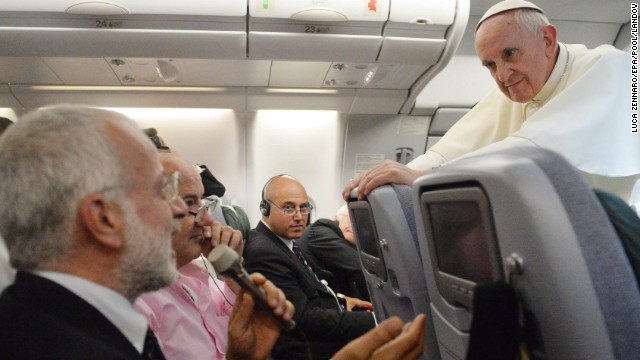 Pope Francis makes some unexpected comments on issues facing the Roman Catholic Church on Monday, July 29. He spoke on the record to journalists on a flight back back to Italy from Brazil after finishing his first international trip as pontiff. Among the topics he addressed were homosexuality, the church's alleged "gay lobby," the role of women, abortion, divorce and the Vatican Bank.
Pope Francis makes some unexpected comments on issues facing the Roman Catholic Church on Monday, July 29. He spoke on the record to journalists on a flight back back to Italy from Brazil after finishing his first international trip as pontiff. Among the topics he addressed were homosexuality, the church's alleged "gay lobby," the role of women, abortion, divorce and the Vatican Bank. 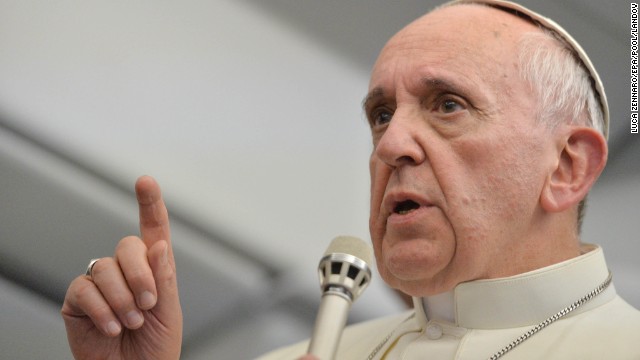 On the flight, Francis said he will not "judge" gay priests, a huge shift from his predecessor, Pope Emeritus Benedict XVI, who sought to bar men with "homosexual tendencies." "If someone is gay and he searches for the Lord and has good will, who am I to judge?" Francis said.
On the flight, Francis said he will not "judge" gay priests, a huge shift from his predecessor, Pope Emeritus Benedict XVI, who sought to bar men with "homosexual tendencies." "If someone is gay and he searches for the Lord and has good will, who am I to judge?" Francis said. 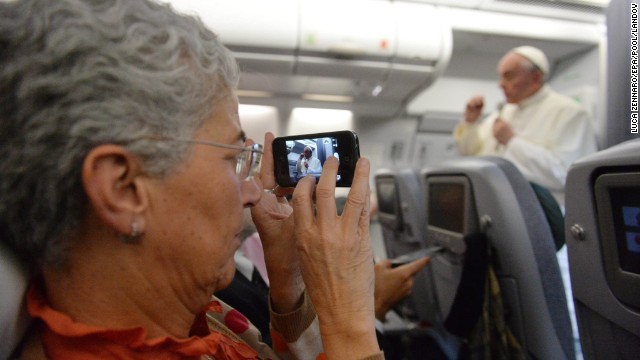 A journalist takes a picture of Pope Francis during the press conference on the flight back to Italy. The pope said the role of women in the church should be deeper, but he brushed aside the possibility of women being ordained as priests. "The church says no. That door is closed."
A journalist takes a picture of Pope Francis during the press conference on the flight back to Italy. The pope said the role of women in the church should be deeper, but he brushed aside the possibility of women being ordained as priests. "The church says no. That door is closed." 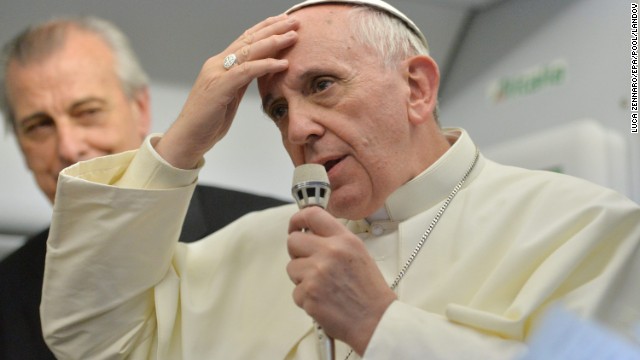 Francis said he had nothing to say about abortion while in Brazil because church teachings against it were clear and his trip was the time for "positive" news.
Francis said he had nothing to say about abortion while in Brazil because church teachings against it were clear and his trip was the time for "positive" news. 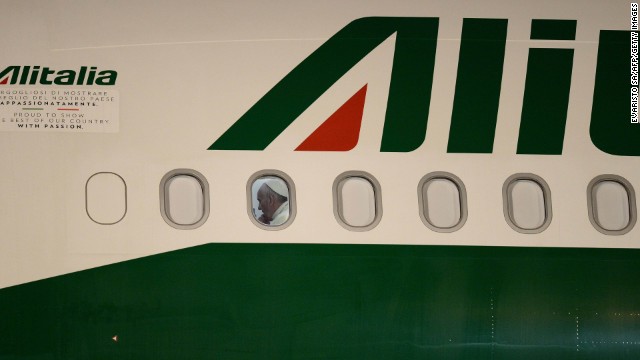 Pope Francis sits inside the plane at a Rio de Janeiro air base Sunday, July 28, before departing for Rome. On the trip back, the pope said cardinals were exploring the question of whether divorced people can receive communion, which they are currently banned from doing. He also said he was unsure what to do with the Vatican Bank, which has faced corruption allegations recently.
Pope Francis sits inside the plane at a Rio de Janeiro air base Sunday, July 28, before departing for Rome. On the trip back, the pope said cardinals were exploring the question of whether divorced people can receive communion, which they are currently banned from doing. He also said he was unsure what to do with the Vatican Bank, which has faced corruption allegations recently. - Pope Francis announced that two former popes will be canonized in April 2014
- Lincoln Chafee: Once again, Pope Francis is showing the path toward tolerance
- He says Francis's papacy offers a chance for us to fight poverty and renew civics
- Chafee: Francis is a shining example for people of Rhode Island and rest of U.S.
Editor's note: Lincoln D. Chafee is the governor of Rhode Island.
(CNN) -- Pope Francis announced on Monday that Pope John XXIII and Pope John Paul II will become saints on April 27, 2014. This is the first time that two popes will be canonized at the same time.
While John Paul II is considered conservative and John XXIII progressive, each extended his hands to the global community. By canonizing two internationally respected religious icons who were quite different from each other, Pope Francis is once again showing the path toward tolerance and civility that is the basis of our collective humanity.
The first Jesuit to ascend to the papacy, Pope Francis recently told La Civiltà Cattolica, the Italian Jesuit journal, that too many people have become obsessed with gays, abortion and contraception. His vision of a more inclusive faith that does not discriminate against anyone is a conviction in which I believe the vast majority of Rhode Islanders and Americans share.
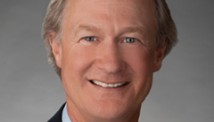
Pope Francis, by his actions and words, demonstrates that he is determined to eliminate the scourge of prejudice in our society and to renew our civic purpose as a people.
For too long, religious extremism has prevailed at the expense of our common human ties. In certain circles in America and countries around the world, there are those people who try to demean others as lesser based on their social standing, skin color or the person they love.
This pope can help transcend the culture wars of the past. While I have forcefully maintained the separation of our public and private lives over the course of my career in politics, Pope Francis' papacy offers an unprecedented opportunity for a partnership that wipes out poverty and fulfills a wealth of public policy goals.
Since taking the helm of the Vatican, Pope Francis has rededicated the pontificate to the causes of economic justice, equality and peace. In visits to poverty-stricken communities, he has praised the courage of the poor, urging society to receive them with love and understanding.
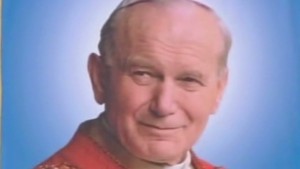 Pope to set dates for papal sainthoods
Pope to set dates for papal sainthoods During a trip to the recession-ravaged capital of Sardinia, where he wore a helmet alongside coal miners, Pope Francis criticized the "idolatry of money," a corporate economy that has erased jobs and increased the gap between the wealthy and the poor. "Where there is no work, there is no dignity," he said. In addition to being perhaps the most populist pope in our history, this pope is free of dogma against minorities, thus, providing a platform for all working families.
On the international stage, Pope Francis has advocated for diplomacy amid the recent tensions in the Middle East. As the humanitarian crisis in Syria escalated and an ominous conflict loomed, he passionately preached a course of peace. The Pope has encouraged our youth -- the next generation -- to empower themselves with compassion and hope instead of clinging to a vicious cycle of animosity and violence.
Rather than narrowly tailoring his message along anti-minority lines, Pope Francis' spiritual doctrine seems to be informed by a commitment to embrace all of humanity.
As governor of a state that is home to many Catholics as well as a diverse group of believers and nonbelievers, these are the values shared in many corners of Rhode Island, where we recently celebrated the 350th anniversary of our founding charter -- the first among the American colonies to protect religious liberty.
Mapping a modern papacy for the Millennial age, Pope Francis has charted a bold new direction for the future of religion. With an enormous heart and acute intellect, he is poised to be a trailblazing leader who reaches far beyond any one individual religious community. Already, Pope Francis is a shining example of the civil society that we aspire to be in Rhode Island and across our country.
Follow us on Twitter @CNNOpinion.
Join us on Facebook/CNNOpinion.
The opinions expressed in this commentary are solely those of Lincoln D. Chafee.







